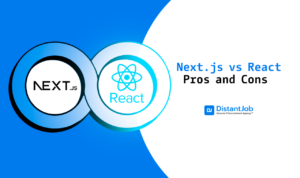Recruiting top talent in today’s market has become a challenging and expensive process, often characterized by intense competition and high costs. The average cost to fill a position is approximately $4,700 and It takes, on average, about 42 days to fill a vacancy, with some positions taking even longer to secure the right talent. With the choice between engaging a recruitment agency or investing in Recruitment Process Outsourcing (RPO), businesses must weigh their options carefully. Both paths offer unique benefits and cater to different hiring requisites, but they diverge in strategy and implementation. As your company strives to attract and retain skilled developers, the decision of which recruitment model to adopt is more than just a logistical one; it’s a strategic move in finding the right talent.
What Is RPO ( Recruitment Process Outsourcing)
RPO solutions have become an enticing proposition to businesses seeking cost-effective ways to expand their operations without increasing their labor force. It also has the potential to improve the quality of hiring decisions, reduce time-to-hire, and increase efficiency.
Recruitment Process Outsourcing (RPO) is a comprehensive form of outsourcing where a company delegates all or part of its recruitment processes to an external provider. In doing so, the company can focus on core business activities, while the agency can provide the expertise and resources to effectively optimize the recruitment process.
Typical RPO Services
RPO agencies have a wide range of services they can offer. Common ones include:
- Planning: The RPO agency is responsible for both looking at the state of their client as it is in the present and making arrangements to meet their needs. But more than that, a planning service has RPO agencies look to the company’s future and strategize their hiring efforts based on those predictions.
- Sourcing: Sourcing services find people that meet their client’s needs. To do so, agencies capitalize on their own networks of talent, as well as look into appropriate external talent pools.
- Screening: After sourcing the candidates, RPO agencies also perform a thorough screening of the candidates to check if they meet all the criteria necessary to work for their clients, not only in terms of technical skills but their cultural fit as well. This involves a rigorous process that includes behavioral and personality evaluations, skill appraisal, and final interviews. In the end, recruiters should have a strong grasp on the best candidates that fit their client’s needs.
- Recruiting: After screening the candidates, the recruitment step is where candidates are hired and turned into actual employees. This involves a few more interviews where the recruiters discuss with the candidates the parameters of their work and working conditions, such as salary and their legal contracts. At the end of this process, should the candidates accept and sign the contract, RPO agencies can also help onboard the new hires on the company itself.
- Reporting: After hiring, RPO are tied to the candidates they helped hire. They become responsible for overseeing and reporting on the work of these employees. This way, agencies make sure hires are up to the standards of their client and also that the hire themself is happy, so they have no reason to leave the company.
What Is a Remote Recruitment Agency?
A remote recruitment agency is a specialized service that helps companies find and hire employees who will work outside of a traditional office setting. This type of agency focuses on matching skilled professionals who are adept at working independently and are well-equipped for the unique challenges of remote work with companies seeking such talent.
They often provide a comprehensive service that includes sourcing candidates, vetting for remote work suitability, and sometimes assisting with onboarding and integration into remote teams. Remote recruitment agencies have become particularly valuable in a globalized job market where the right fit for a role might not be geographically close to the company’s headquarters.
To provide these services, agencies stay on top of the latest recruitment technologies and methodologies, allowing their clients to get the best service possible and ultimately find the professionals they require.
In the case of IT recruitment, they also regularly brush up on coding languages and tech so they can find the most suitable talent and advise their clients. This is important if you’re dealing with bleeding-edge technology or have strict requirements for a certain position.
Typical Remote Recruiting Services
Remote recruiting services include a broad range of offerings tailored to finding, assessing, and hiring candidates who are not only skilled but also a good fit for working outside of conventional office environments. Here’s a breakdown of these services:
- Candidate Sourcing: Remote recruiting agencies have access to a global talent pool and use various tools and platforms to identify potential candidates with the desired skill set for remote positions.
- Skill Assessments: They conduct comprehensive skill assessments to ensure that candidates possess the necessary technical abilities, as well as the soft skills required for effective remote work.
- Interviewing: Agencies handle the initial interviewing process, which may include video interviews, to gauge candidates’ communication skills and their suitability for remote work.
- Background Checks: To ensure trustworthiness and reliability, remote recruiting services may perform background checks, including previous employment verification and criminal history checks.
- Culture Fit Analysis: Understanding that remote workers must align with a company’s culture, these agencies often evaluate candidates for cultural fit, ensuring developers can integrate well with existing teams.
- Onboarding Support: Some agencies provide onboarding services to help new hires adjust to the company’s systems and processes, ensuring a smooth transition into their remote roles.
- Remote Work Training: Agencies may offer training to candidates on best practices for remote work, including time management, digital communication, and use of collaboration tools.
- Contract Negotiation: They might assist with contract negotiations, focusing on typical remote work considerations such as flexible hours, time zone differences, and equipment provision.
- Compliance and Legalities: Remote recruiting services stay informed about employment laws in various countries, helping companies navigate the complexities of hiring remote workers internationally.
- Ongoing Support: Some agencies provide continuous support and check-ins to ensure both the employer and the employee are satisfied and any issues are addressed promptly.
By using recruitment agencies such as DistantJob, companies can not only streamline their hiring processes but also potentially realize significant savings by quickly filling vacancies with the right talent.
Comparing RPO and Remote Recruitment Agencies
Recruitment Process Outsourcing (RPO) and remote recruitment agencies are both involved in hiring and recruitment services, but they differ significantly in their approach and the extent of their services.
Here are the key differences between the two:
- Scope of Services:
- RPO provides a broad range of recruitment-related services and may fully integrate with a company’s HR department.
- Remote recruitment agencies specialize in sourcing remote talent worldwide and ensuring that they are equipped for successful remote collaboration.
- Integration with Client Companies:
- RPOs typically offer a deep level of integration, potentially taking over the entire recruiting function.
- The recruitment agencies operate more independently, serving as a connector between remote developers and companies without deeply embedding in the company’s internal processes.
- Long-Term Strategy vs. Immediate Need:
- RPOs are often used for ongoing recruitment needs and help in building a long-term hiring strategy.
- Agencies could be more focused on the immediate placement of developers, quickly connecting companies with remote candidates ready to jump into specific roles.
- Expertise in Remote Work:
- While RPOs can recruit for various arrangements, a service like DistantJob likely has specific expertise in the remote work sector.
- The agency offers additional support and guidance on maintaining productivity and communication with remote teams.
- Customization and Flexibility:
- RPOs often offer a highly customized approach, tailoring their services to the company’s evolving needs.
- Remote agencies provide more standardized services that focus on the unique aspects of remote work and the dynamics of a distributed workforce.
- Time Efficiency: Shorten lengthy hiring timelines to as brief as two weeks with remote recruiting agencies. Experience reduced time-to-hire with the agency’s vast networks.
Conclusion
If your company lacks the internal resources necessary for managing its recruitment need or wishes to outsource this entire process for the sake of efficiency may be well-served by a remote recruitment solution.
DistantJob, for example, is an IT remote recruitment agency that is committed to helping organizations achieve their goals. We can provide a tailored solution designed to meet the specific needs of your organization.
On the other hand, if you want to hire in-house but need someone to train and guide your staff, DistantJob can also help with their 10+ years of remote tech recruitment expertise! We have professionals that can counsel you on the best strategies to hire the people you need from all over the globe. Get in contact with us!
FAQ
Recruitment Processing Outsourcing by definition is concerned with the recruitment process and all tasks it involves (such as candidate gathering and assessment), while Business Processing Outsourcing is more focused on business processes, usually divided between back-end (payment processing, quality assurance, etc.) and front-end (marketing, sales, customer relations, etc).






